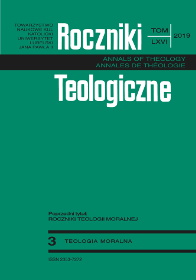Person and Conscience: Augustinian Strands in John-Paul's Ethics
Abstrakt
Osoba i sumienie. Wątki augustyńskie w etyce Jana Pawła II
Wielkie uznanie dla encykliki Veritatis splendor zrodziło się z jej augustynizmu. W myśli Wojtyły dominują dwa augustyńskie motywy, jeden zaczerpnięty z Maxa Schelera, drugi z Henri de Lubaca i nouvelle théologie. Jedność bytu i dobra to podstawa, na której potwierdza on integralność ontologiczną osobowego podmiotu działania. Pierwszeństwo łaski Bożej, prowadzącej człowieka jako podmiot działania do moralnego urzeczywistnienia, kieruje jego myśleniem o sumieniu jako wewnętrznym dialogu z Bogiem. Cała moralna samoświadomość zależy od tego spotkania, natomiast ciągłość osoby umożliwia rozwój moralnego doświadczenia.
Bibliografia
Augustine. De natura boni. PL 42.
Balthasar, Hans-Urs von. “Neun Sätze zur christlichen Ethik”. In J. Ratzinger et al. Prinzipien christlicher Moral. Einsiedeln: Johannes, 1975.
Kant, Immanuel. Kritik der reine Vernunft. AK 5.
Scheler, Max. Der Formalismus in der Ethik und die materiale Wertethik: neuer Versuch der Grundlegung eines ethischen Personalismus. Halle: Niemeyer, 1913 (1916).
Spaemann, Robert. Personen. Stuttgart: Klett-Cotta, 1996.
Wilkins, John (ed.). Understanding `Veritatis Splendor'. London: SPCK, 1994.
Wojtyła, Karol. Osoba i czyn (1969). English: The Acting Person, tr. Andrzej Potocki, Anna-Teresa Tymieniecka. Dordrecht & Boston: Reidel, 1979.
Copyright (c) 2019 Roczniki Teologiczne

Utwór dostępny jest na licencji Creative Commons Uznanie autorstwa – Użycie niekomercyjne – Bez utworów zależnych 4.0 Międzynarodowe.





